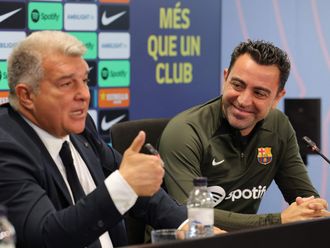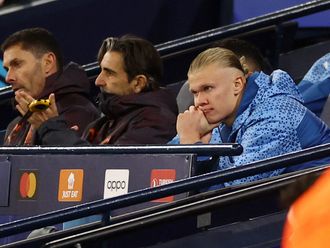The majority of La Liga clubs might well have been casting envious eyes in the direction of the English Premier League recently.
You could almost hear the collective sigh in Spain as EPL Chief Executive Richard Scudamore announced a bumper £5 billion-plus TV deal for his member clubs. A not insignificant amount that will be distributed evenly to the 20 clubs in the division, before bonus payments are made.
Contrast that with the situation in Spain, where Real Madrid and Barcelona devour the lion’s share of TV revenue, leaving the rest to feed on scraps.
The situation arises of course because, to this point, Spanish clubs have been free to negotiate their own TV deals. Barcelona, for example, have just signed off on a one-year deal with Telefonica.
The telecoms giant takes over from Mediapro to screen all Barca matches from the start of next season until the beginning of the 2016/17 campaign when, finally, La Liga and the Spanish government have pledged to introduce measures for a collective bargaining process for its members.
It’s not before time either, as there has been the very real threat of strike action by some clubs for a while now.
When the bottom clubs in the league are earning a paltry €18 million or so per season, compared to approximately €140 million for Real and Barca, you can easily understand their ire.
How is it even possible for Atletico Madrid, the La Liga champions, to earn in the region of €100 million per season less than sides that finished below them.
The worldwide pull of Los Blancos and La Blaugrana is acknowledged, but with the lack of a level playing field becoming increasingly evident, La Liga is becoming decreasingly relevant as a product. I’ll go as far to suggest that it’s becoming a turn-off for many connoisseurs.
Clearly, therefore, this new way of working is likely to benefit all concerned and thus the product globally.
Not that the agreement of both Barca and Madrid will be easily forthcoming. Both Florentino Perez and Josep Maria Bartomeu have, at various stages, expressed indifference toward the proposed changes.
Of the two, Barcelona seem the more amenable to negotiate, but even they acknowledge that signings such as Neymar and Luis Suarez may be a thing of the past if the wealth is spread more evenly.
It’s a moot point. If the resolutions are not passed into law and the cash not shared more equitably, then soon enough the dissolution of once-proud clubs such as Parma will become commonplace in Spain. No teams equals no La Liga, and nobody wants that to happen.
— The writer is a freelance journalist and Spanish football expert











